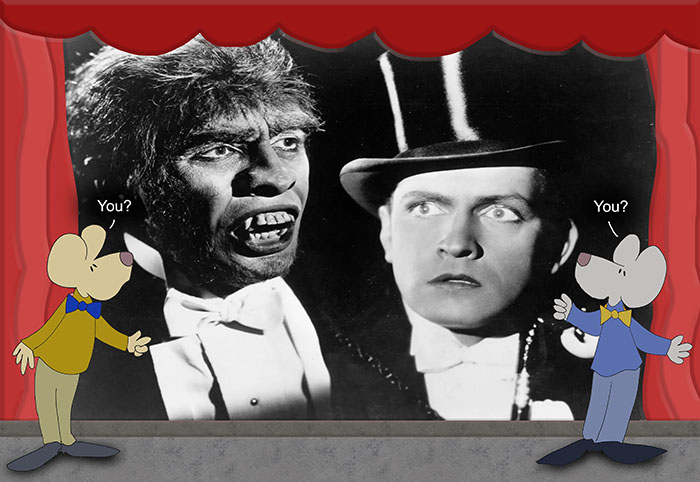I don’t like when it happens. Not one bit. But every once in a great, great while, I turn into my evil twin. Maybe not evil, but definitely Crabby Appleton. Unexplained. It doesn’t happen much these days. Perhaps I’m getting older and mellowing with age.
I’m always reminded of the old story, “The Strange Case of Dr. Jekyll and Mr. Hyde” by Robert Louis Stevenson. It was published on this date, January 5, 1886.
I’ve never read the book, but I’ve seen the movies. Not all of them, as there are over 123 film versions, not including stage and radio.
The novella is about a dual personality. It gives us a look at the man, Dr. Jekyl, an intelligent physician who turns into a psychopathic monster. This was caused because he took a drug intended to separate good from evil in a personality.
As a note. Many people use the term “Dr. Jekyl” when they refer to someone terrible. But it was, in fact, Mr. Hyde who was the rotten egg.
Moving on to the author.
Stevenson had an interesting start to life. He was born in 1850 in England. As with so many other writers of that time, it seems, he was a sickly kid and spent a great deal of time in bed. Also, he looked a bit odd in appearance. Even still, I’ve often wondered how he came up with such a story.
It appears he conjured the tale while lying down. Stevenson wrote The Strange Case of Dr. Jekyll and Mr. Hyde in six days while confined to bed.
Three days, actually, using pen and inkpot. He had written the manuscript–some 30,000 words– and let his wife Fanny read it. She said that the story’s allegory was not evident enough. So Robert took the whole thing and tossed it into the fireplace after Fanny’s review. Then, in the next three days, he wrote a second draft of the story. And that is the one we know today.
Stevenson said it came to him in a dream. He had long been fascinated with split personalities but couldn’t figure out how to write about them. Then one night, he had a dream about Dr. Jekyll and Mr. Hyde. He was screaming in his sleep, and Fanny awakened him. He got upset, asking why she woke him because he was in the middle of letting the story unfold.
Here’s another piece of the pie. Stevenson had been prescribed medicinal cocaine to treat a hemorrhage. Well, cocaine has a way of affecting the mind. It could very well be that the inspired dream for the story occurred during a cocaine-fueled slumber. And another thing. Coke gives you some fast-moving energy, which may also be the reason he could crank out 30,000 words in three days. Robert. Robert. He later professed an affection for the drug.
Regardless, Dr. Jekyll and Mr. Hyde was immediately successful. Right off the bat, it sold 40,000 copies in six months. Before long, there were more than 250,000 pirated copies in North America. People completely grabbed on to the moral message of the story. It caught on with the whole religious scene. They wrote about the book in religious newspapers, and preachers gave sermons about it in churches.
Within a year, there was a play based on the book, and soon there were productions in Scotland and the United States. Treasure Island gained him notice. But, Jekyll and Hyde was by far Stevenson’s most successful novel.
A final note. On December 3, 1894, Stevenson was talking to his wife. He was struggling to open a bottle of wine. Then he looked at her and said, “What’s that? Does my face look strange?” He fell over, collapsing to the floor. He died within a few hours, at the age of 44, most likely from a cerebral hemorrhage. And away he went.
Thinking about all of this, it is clear that we have many sides to ourselves. Some of those are good, and others, we may not be entirely proud of. But we are the whole package, with these little components hidden underneath, all of them a part of our “true” selves. And as we grow, we learn to show the best side of ourselves in any situation. Or at least we hope we can grow into that person.
==========
“A human being is a being who is constantly ‘under construction,’ but also, in a parallel fashion, always in a state of constant destruction.”
― José Saramago
===========
“There are in fact two things, science and opinion; the former begets knowledge, the latter ignorance.”
― Hippocrates
===========
“When you are dead, you do not know you are dead. It’s only painful & difficult for others. The same applies when you are stupid.”
― Philippe Geluck
===========
If it is the whole package, don’t be Hyde.
